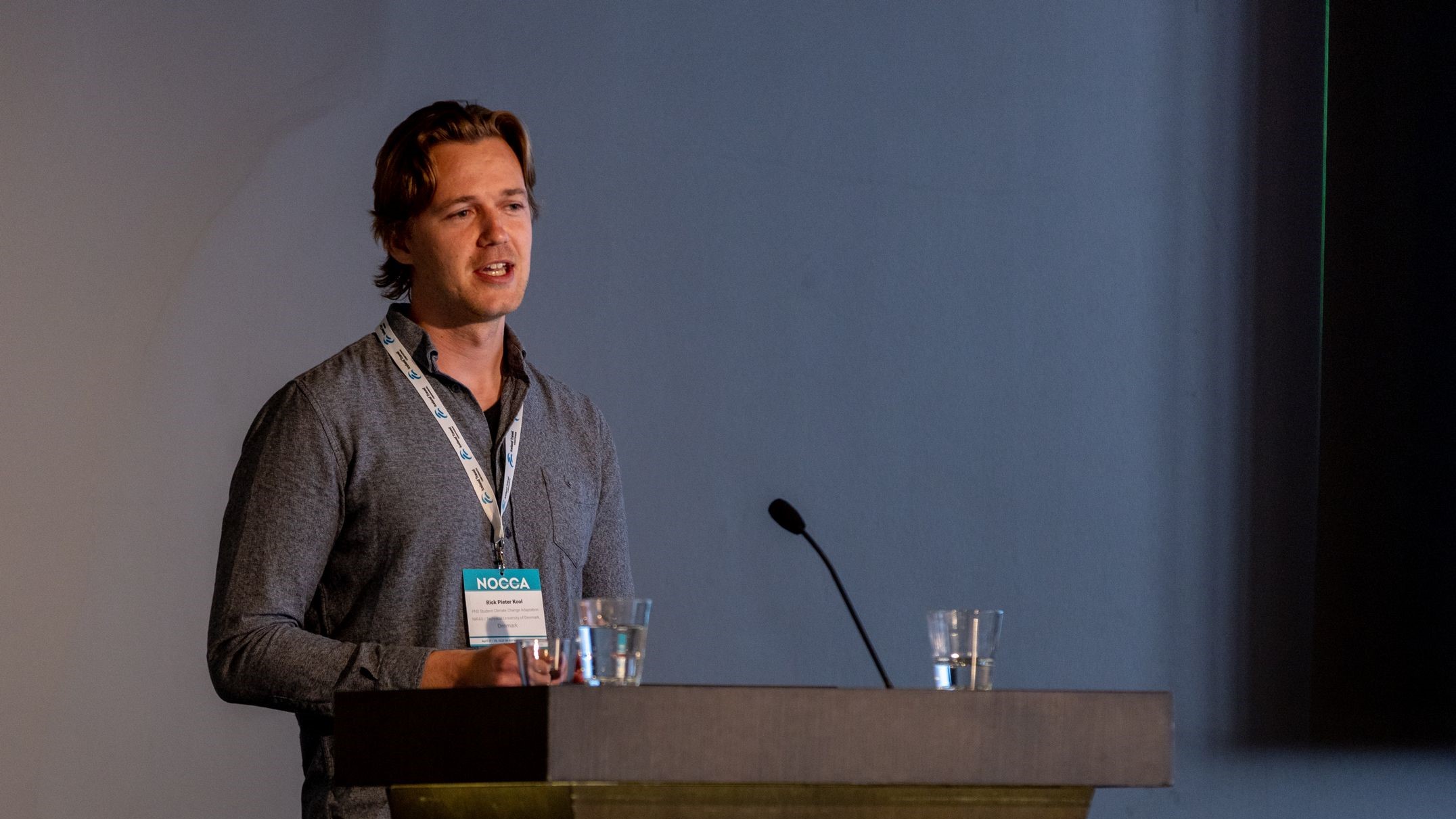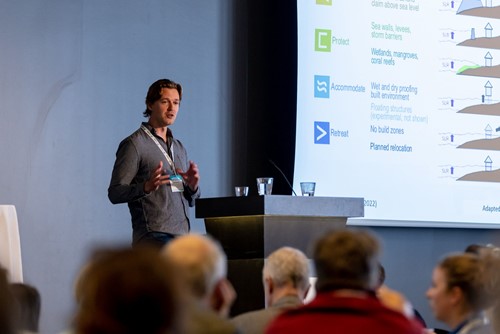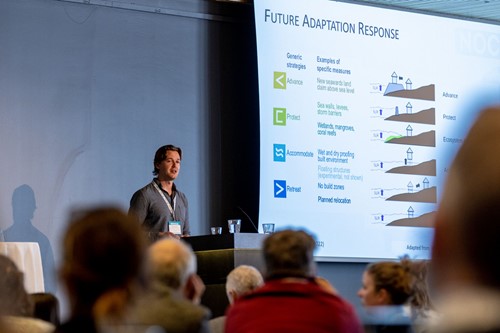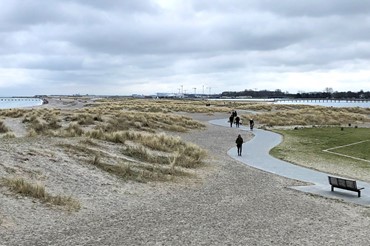
Adaptive Coastal Planning under Climate Change Uncertainty
The focus of this industrial PhD project is to investigate novel dynamic concepts for long-term coastal planning and climate change adaptation, i.e. Dynamic Adaptive Pathway Planning (DAPP), integrating knowledge from the technical, economical and climate sciences.
Due to climate change, low-lying coastal areas all over the world are increasingly threatened by flooding or even permanent inundation due to combinations of sea level rise, storm surges and other extremes, which demand urgent action.
Some coastal communities decide to live with the risk, whereas in most places, dedicated measures such as dikes, sea walls, and nature-based solutions (or combinations thereof) are installed to protect human and natural systems, including ecosystem services.
Where there are limits to adaptation, a managed retreat may be the only viable solution. We have to respond by making changes to our infrastructure in order to reduce this problem. We know the sea level will rise over the coming centuries, however it is not possible to predict when how much sea-level rise will happen where. Therefore we will have to make choices that are not perfect as we do not have all the information now.
In this study PhD study we develop future ‘adaptation actions’ to respond to this problem, and we evaluate how different choices might result in different benefits and drawbacks over time, depending on the future we will live in. Combinations of future actions are called adaptation pathways, which will help decisionmakers see potential future problems with regards to sea-level rise and inform planning responses for municipalities.
Gathering specialists applying the Dynamic Adaptive Policy Pathways methodology
Recently in collaboration with DTU NIRAS hosted a symposium with experts, policymakers, and practitioners to reflect on key lessons from applying the Dynamic Adaptive Policy Pathways (DAPP) methodology to sea-level rise adaptation in Denmark.
We explored the following main topics:
-
Scalability – Aligning local, regional, and national adaptation efforts.
-
Cross-Integration – Bridging climate adaptation across sectors and hazards.
-
Transferability – Consistency in DAPP implementation across municipalities.
-
Governance – Balancing long-term planning with short-term decision-making.
-
Monitoring – Keeping DAPP as a continuous process.
Over the following months we will turn the lessons learned into a scientific manuscript comparing the lessons learned into an international context, and a technical note to help decision and policymakers make better decisions under climate change uncertainty.
This will lead to an increased need for the development of adaptation plans on a global scale but also within Denmark over the coming years. The project will result in an improved framework from lessons learned within the area of long-term climate adaptation planning in coastal environments from a multi-hazard perspective.
Gathering inspiration from abroad
During the PhD project there have been several opportunities to go abroad and get inspired / share knowledge with other students, professionals and colleagues. It was great to attend several conferences such as the Nordic conference On Climate Change Adaptation (NOCCA) and the International Conference on Coastal Engineering (ICCE) in order and present the work we are doing, and be exposed to other ongoing research. There is a table below with the PhD milestones and highlights from courses and conferences.
During the Nordic conference on climate adaptation (NOCCA 2023), I was invited to give a presentation and workshop on adaptation pathways. It was a great opportunity to share the lessons learned from applying the DAPP method in New Zealand and Denmark. In particular, the workshop provided the opportunity to engage with the participants in a real-world case in Iceland, and explore potential future pathways. The outcomes have been included in the policy The Policy brief can be found here.
Some of the outcomes from the policy brief:
-
Communities are key to build consensus around adaptation responses
-
Communities are well-placed to identify vulnerabilities and thresholds of climate hazards
-
Adaptive long-term thinking is the foundation for building a long-lasting plan


Project start: June 2022
Project ending: June 2025
BU/department/ industry to which the project is associated: Coastal and Offshore Engineering
Cooperation-partners: Technical University of Denmark
Project milestones
October 2022: Future Earth Research School (FERS): Attended a two-week course on climate adaptation and sustainable risk management in Bertinoro, Italy.
December 2022: ICCE Presentation, Australia: Presented our work on adaptation pathways in Denmark at the International Conference on Coastal Engineering (ICCE) in Sydney. It was a great opportunity to share insights from our case study and see the advancements in climate adaptation and nature-based solutions for coastal areas.
March 2023: Research Stay in Wellington, New Zealand: The research stay was hosted by Victoria University of Wellington where I worked on advancing our research on adaptation pathways where I attended:
Case Study Workshop: Organized a workshop with utility providers to discuss adaptation strategies for our case study in Petone, New Zealand.
10 Years of DAPP Symposium: Engaged with experts who have worked with the Dynamic Adaptive Policy Pathways (DAPP) framework to reflect on lessons learned over the past decade. It was organized by Victoria University of Wellington.
April 2023: NOCCA (Nordic Conference on Climate Change Adaptation) Iceland: Presented our work at NOCCA 2023 in Iceland on the Petone case study in New Zealand and had the opportunity to organize a workshop where participants explored DAPP applications in an Icelandic case study.
October 2023: Norwegian Water Resources and Energy Directorate: It was great to be invited to see and ask questions about the outcomes from the ClimDesign project, aimed at modelling extreme precipitation, and share experiences with adaptive adaptation.
November 2023: DMDU Meeting Netherlands: Participated in the Decision Making Under Deep Uncertainty (DMDU) society meeting at Deltares, exchanging knowledge on adaptive decision-making.
December 2023: ASCE Inspire, Washington D.C.: Presented and joined a panel discussion on adaptation pathways. It was inspiring to see diverse projects focused on climate-resilient infrastructure in the U.S.
April 2024: PIANC Conference, Cape Town: Shared experiences from applying adaptation pathways in Denmark for low-lying port areas. It was valuable to attend the PIANC conference, discussing best practices in coastal and maritime adaptation.
July 2024: Klimatorium, Lemvig: Participated in a panel discussion and presentation, engaging with colleagues from different backgrounds on climate adaptation.
Nov / Feb 2025: Presentation for ScienceTalenter: The camp introduced high school students to the concepts of climate change and adaptation. The students developed their own adaptation projects. It was great to give a talk and it was inspiring to see the strategies they came up with for their cases.
Articles and publications
The project started before the summer 2022 and is establishing the first case study. For context please have a look at earlier work where this study builds on:
Kool, R.; Lawrence, J.; Larsen, M.; Osborne, A.; Drews, M. Spatiotemporal aspects in coastal multi-risk climate change decision-making: Wait, protect, or retreat?, Ocean & Coastal Management, Volume 258, 2024, https://www.sciencedirect.com/science/article/pii/S0964569124003703?via%3Dihub
Kool, R.; Lundov, M.; Schow, C.; Hubard, E. MANAGING UNCERTAINTIES IN URBAN DEVELOPMENT AND CLIMATE CHANGE ADAPTATION: A CASE STUDY IN ADAPTATION IN A COMPLEX COASTAL ENVIRONMENT USING DYNAMIC ADAPTIVE PATHWAYS IN SKIVE, DENMARK. (2023). Coastal Engineering Proceedings, 37, papers.32. https://icce-ojs-tamu.tdl.org/icce/article/view/12671
Kool, R.; Lawrence, J.; Drews, M.; Bell, R. Preparing for Sea-Level Rise through Adaptive Managed Retreat of a New Zealand Stormwater and Wastewater Network. Infrastructures 2020, 5, 92. https://doi.org/10.3390/infrastructures5110092
Lawrence, J.; Boston, J.; Bell, R.; Olufson, S.; Kool, R.; Hardcastle, M.; Stroombergen, A. Implementing pre-emptive managed retreat: Constraints and novel insights. Curr. Clim. Chang. Rep. 2020, 6, 66–80. https://doi.org/10.1007/s40641-020-00161-z
More about the project
Project status: Ongoing
5 main keywords about the project: Climate Change, Adaptation, Sea-level rise, Resilience, Adaptive Planning
Educational background: Civil Engineer from DTU (Msc.)
Hopes for the future works of the project: To help society, in particular coastal regions, overcome challenges brought on by climate change and navigate long-term adaptation through an uncertain future.
The importance of cooperating with NIRAS: NIRAS has a longstanding reputation in consulting in Denmark and abroad on coastal adaptation using a multi-disciplinary approach. Collaborating on this topic with the opportunity to incorporate ongoing projects as case studies is highly valuable to ensure the applicability of the research.
Reach out

